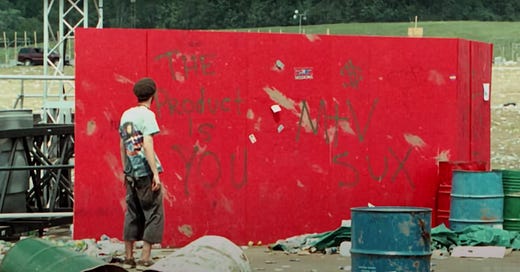Over Twenty Years Later, "Woodstock 99" Formally Explains THAT Weekend Event
aka the other burning (white) man festival

Dear Moviegoers,
“… it’s not our fault.”
- Fred Durst, walking off stage
“Why not!? That’s the REAL question.”
-Shirtless white male concert-goer, as others tear down the festival barrier wall
I would listen to my Woodstock 99 2-Disc CD, in my room, alone, quite often going into the start of the 2000s, usually bouncing from DMX and Creed to Our Lady Peace and Lit. Of course, Metallica would pop on, but that was for when I did jumping jacks and the like. Limp Bizkit? This live album didn’t have a certain popular song of theirs on it, so I’d go to my Significant Other CD instead.
Yes, I was into Durst, Borland, and crew for a short period of time, even going to an Atlanta concert just before the end of 1999. Thankfully, I stayed in the high-up seats. Looking on at the moshpits and clouds of pot in the air, I had a spectator’s privilege of witnessing the rage without being deep in it. I’d stand up here and there, mostly for “Nookie” and “Faith”, but the majority of my time was spent seated, overwhelmed by the loud noise and the young adults acting out - those of whom some in my Middle School classes would wish to emulate in the coming years.
A good friend of mine who I met at college in 2005, described nostalgia for the 90s as some kind of mass delusion - a horrible decade for culture, he’d say (though I’m paraphrasing). These were the years he and I grew into teenagers during. And these pre-9/11 turn of the century days were… a f***ed time too. Welcome to paradise.
The new HBO documentary Woodstock 99: Peace, Love, and Rage fully articulates with grand hindsight and maturity just how f***ed a time it really was. It’s an apocalyptic vision for sure. Bordering on being a period-piece slasher flick, the film combs through so much material and utilizes such a fine array of modern commentators and journalists - all of which brutally criticize and contextualize everything that went down - that any hope of reaching the credits with some comfort or fond feelings for that decade and for the state of which we were in/are still in… become obliterated.
To as much of an extent as the documentary could push - and push it does - this coagulation of mostly white young adults are depicted as both product and victim, as both marketing tool and marketing prey, stuck in that sour spot between two eras in America: Reaganomics and “Dubya”. When Kid Rock performed, he spoke of the Clinton sex scandal, declaring the President as “a pimp.” He likely didn’t care about that situation, but the crowd cheered and roared at his words anyway. Did they care? Probably not either.
So… why be that way?
Festival promoter John Scher was openly interviewed in the film, but presented such a radically different narrative of the event than what everyone else was watching and discussing, to the point that he might as well have worn a hat saying “Out of Touch” and a shirt saying “#Deflect.” He does himself no favors when claiming no one was really hurt, that only a few sexual assaults were reported, and that any problems were Fred Durst’s fault. I wanted to point Scher out as THE villain here, but it’s in his favor that the documentary goes for more of a gut punch than him. And punch in the gut, that man sure deserves.
In that 2-Disc Live Album set I had, we hear Scher towards the end, asking for everyone to calm down on the last night. Then, Red Hot Chili Peppers kick in. Why include that audio bit in your CD release? Were the promoters trying to act as if the fires and riots and sexual assaults were just an experience to have been had? Listen to what you missed out on, I suppose.
Why be this way?
“That’s the real question,” sir.
It’s as if nihilism and greed met, sold a decade of kids some overseas-made plastic junk, told them what to listen to, riled up some old people to rant against their rebellious tendencies, held an event with the weirdest lineup ever under an unforgiving sun with little to no safe or affordable amenities and infrastructure… and put out a CD celebration of it all anyway.
Why be this way? Why? Who cares. Nobody cares. Nothing else matters, so a song says. Get a horde of kids who think they believe this, and see what happens when they’re treated to roll in “mud” for a high-priced, once in a generation “experience." Pfft. The 90s really were the worst, and things indeed have morphed onto different platforms, from the crowd-surfing wood boards to message forums to Insurrection attempts.
The movie works so well as both tragedy, horror show, and critical essay, that I shook with sadness and anger for a few minutes after. That weekend wasn’t just summed up, that decade wasn’t just summed up - they were stuff meant to break. Expand on that, and you’ll find yourself in dangerous territory.
Woodstock 99: Peace, Love, and Rage has more nuance to it than my review suggests or even covers, cutting in footage and music at just the right moments in interviews to pinpoint and lay down exclamation marks to the meaning of it all. It’s a long-form story with a short-form sense of humor and power, rivaling the energy packed into the unassuming package of a firecracker. It’s a loud and intelligent production absolutely, but…
…is it wrong to say that I kinda prefer the official concert VHS over this documentary? That tape had multiple levels of meta going on, being a story inside a lie inside another story, and so on. Couldn’t be duplicated. Should never be. 3.5/5 (though 4/5 might be my rating down the line)




